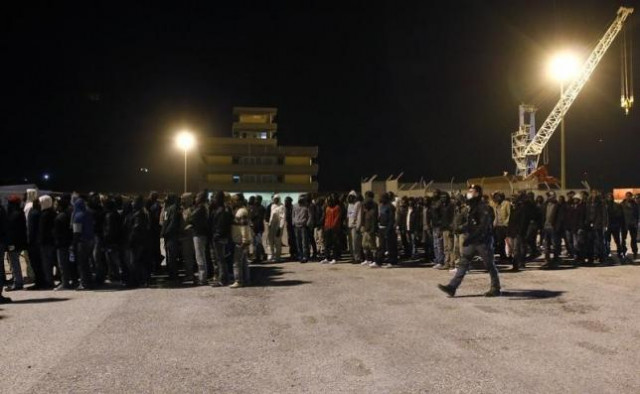Italy says hotspots to focus on fingerprinting migrants
Italian administrator Mario Morcone expects to collect fingerprints from up to 90 percent of the migrants

Police escort migrants as they are disembarked from a navy ship in the Sicilian harbour of Augusta March 4, 2015. PHOTO: REUTERS
Italian administrator Mario Morcone told Reuters he expects to collect fingerprints from up to 90 percent of the migrants.
"Certainly there's going to be a greater determination to get the fingerprints," Morcone said.
Italy will allow a "proportionate" use of force to obtain fingerprints, which it has not done regularly in the past, "to the extent that it is compatible with Italian law".
Of the more than half a million refugees and migrants to arrive in Europe by boat across the Mediterranean this year, 131,000 have come through Italy, making it a frontline state in the continent's biggest refugee crisis since World War Two. Only Greece has seen more arrivals this year.
In recent years, Italy has failed to identify thousands of migrants who landed on its shores mainly because the refugees themselves refused to be fingerprinted in order to sidestep EU law, which says they must ask for asylum in the country where they enter the bloc.
This has led northern countries to accuse Italy of undermining the Schengen Area, where there is free movement of people between countries, by letting migrants move on unchecked.
The EU agreed to a plan last week aimed in part at helping border countries like Italy and Greece deal with the surge by relocating asylum seekers to non-border countries.
Read: Austria warns migration crisis could lead to use of force on borders
But the plan also foresees setting up "hotspots" in the border countries to screen migrants more carefully. Italy has agreed to open six, and the European Commission said Greece will model its own hotspot network on Italy.
Morcone offered a first glimpse of how, starting in November, the hotspots in Italy will work, saying that whoever does not agree to give their fingerprints, or who does not intend to seek asylum, will be sent to a detention centre to be deported.
Limits
During the first half of the year, Italy fingerprinted two-thirds of the almost 92,000 migrants who arrived by sea, Morcone said, citing official numbers. In the past, Italy has fingerprinted a far smaller proportion.
But the hotspots will have limits that are dictated both by Italian law and what Morcone called the country's human rights tradition.
According to Italian law, migrants can be held at the hotspots only for 48 hours, so within a few days they will be moved to already existing immigration centres, Morcone said.
If a migrant agrees to be fingerpinted and wants to seek asylum, he or she will be moved from the hotspot to an immigration centre whose tenants can come and go as they like while their applications are processed.
If instead a migrant refused to be fingerprinted or does not plan to ask for asylum, he or she will be sent to "Centres for Identification and Expulsion" (CIE), to be -- if possible -- deported. In the CIE, migrants can be held under lock and key for up to three months.
Read: Ban opens UN assembly with call for action on Europe's migrant crisis
Italy had only five CIE in operation at the end of July, and Morcone said more might have to be built, but he ruled out using a list of "safe" countries -- an idea supported by the European Commission -- by which deportations of some nationalities can be fast-tracked.
Asylum is granted or refused to an "individual" and not an "entire category", Morcone said.
Italy plans to expand its "voluntary" expulsion programme, in which migrants are given economic support to return to the home countries, Morcone said, while it is still trying to improve the process of forced deportation.
Many bilateral agreements between Italy and African countries, which are necessary for expulsions, are lacking, he said.
No concentration camps
But efforts to detain and deport economic migrants may be undermined by the stark choice migrants will have to make at the hotspots.
They will be asked to choose between refusing to be fingerprinted, getting locked up and possibly deported, or giving their fingerprints, asking for asylum and moving into an open immigration centre.
"In my opinion, the vast majority will ask for asylum," Morcone said, also because no one will be prevented from seeking asylum based on their nationality.
Despite the difficulties in keeping a tight grip on undocumented immigrants, Italy will not set up huge detention centres for them even if some EU countries may prefer it did, Morcone said.
"After identification, what is done (with the migrants) is a national problem," Morcone said. "Italy cannot have concentration camps in Sicily or Calabria to please the French or Germans."



















COMMENTS
Comments are moderated and generally will be posted if they are on-topic and not abusive.
For more information, please see our Comments FAQ